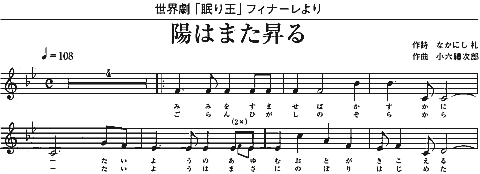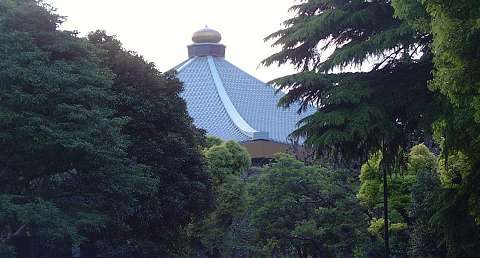|
<< -- 6 -- Keith Bramich A JAPANESE 'RIVERDANCE'?

Artistically, the whole is not necessarily a sum of its parts, and whilst
Sleeping King is a highly professional, skilled and polished production,
some aspects of the special effects (Princess and dragon ball hoisted up
on ropes), the story (unexplained reappearances of Otomo-no-Dainagon and
the Princess) and lyrics ('my name is Kaguyahime; I came here by order
of the King of the Moon; I'm actually an incarnation of a dragon ...')
appear a little silly.
In some ways the Kabuki, choreography, lighting and colour make this
a kind of Japanese Riverdance, intriguing in its crossing of cultures,
and highly successful in the aims of its sponsor, TEPCO, a Tokyo-based electronics and power company promoting
art with as wide an appeal as possible. (2002 is Japanese year fourteen,
and this annual performance has been filling the hall since year one -- i.e.
since the start of the current Emperor's reign.)

The choral finale -- 'The sun rises again' (with blue and white lighting)
is sung by the huge cast, all on stage at once, swaying from side to side.
The melody and lyrics are printed in the programme, and Yoko Oshita, a well-known
TV announcer, acting as compere at both the beginning and end of the performance,
asks us to join the performers in a re-run of the song. The (almost entirely)
Japanese audience is reticent, though -- perhaps everyone is simply more
interested in soaking up the on-stage splendour?

It's certainly a spellbinding experience, and the ninety minute performance
(without interval) is suddenly over, and we're out of the hall, walking
in the surrounding park and wondering about the meaning of the story. Is
it allegorical? The glossy programme asks 'if we can reach light and a true
heart again, living in a Japan which has sunk into darkness?'
As a 'fair-haired, white-skinned, blue-eyed gaijin', I don't dare
to comment on this, but could the answer simply be the old adage that love
conquers all?

Grateful thanks to Tamiko Izawa for making this article possible, and
to Yuri Izawa for her translations from Japanese -- before, during and after
the concert.
Copyright © 19 May 2002
Keith Bramich, London, UK
 << Music
& Vision home
Bernard Roberts >>
<< Music
& Vision home
Bernard Roberts >>
|

